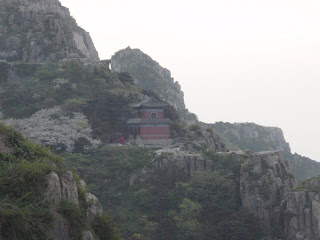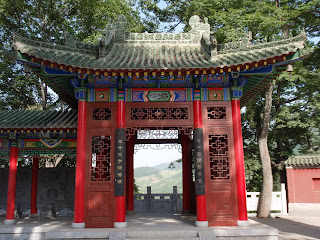And here we are, we don't speak the language. We've been here a month(!). How is that possible?
Well, first of all, I did learn the 3 most important things:
*thank you: shay shay
*hello: knee how
*(where's the) bathroom? : W.C. (Britishism, short for Water Closet)
And then, on our first excursion outside of Xian, we were continually approached by folks who wanted us to rent a horse to ride: Shee ma means ride horse. One of my greatest successes was to figure out,with the help of a phrase book, that boo is a negative, when used with a phrase. So, Boo shee ma (no ride horse!)just stopped 'em cold...they would literally just stop............and then they'd laugh like crazy and repeat it to their pals standing around. And they wouldn't ask me again. Big success.
We can say good-bye, too: Sigh Chen (or Jen)
and on the rare occasions that somebody is thanking us for something, I learned to use boo again: boo shay ("don't mention it" or "it's nothing")
People are generally so delighted that you are trying that you get a lot of points. But then, they may think that you really can speak Chinese and launch into a stream of incomprehensible sound and you can just grin sheepishly and shrug and say in your own language (even tho you know they don't understand you): I don't know, I'm sorry.
Standing around looking utterly baffled is good if people have the time and the curiosity to engage and help you. Gestures say a lot. There are hand signs for the numbers up to 10 (and there are always calculators, of course, if you are in a mercantile situation)
AND, many Chinese have a little English (often learned by rote, which has its limitations, though they're ahead of us)..that's the greatest help. It's usually pretty simple stuff. We've found that "if" situations are hard to express as are times such as yesterday or tomorrow (and that these are easily mixed up)
We are often asked where we are from, and although it is tempting to lie, we have not yet. If US or USA doesn't seem to ring any bells and we then say America, the asker will say "Ah! Megwah." so, now (if we understand that is what we're being asked) we just say Megwah. They get a big kick out of that.
It's hard to say if our pronunciations of Chinese are worse than theirs of English. I know I am rarely understood when I try a word or 2 past my vocabulary of 5. Kuan Yin, Tai Chi, and tofu are several that I've been unable to get across (much to my surprise)
But you've gotta get Cal to do "scrambled eggs" the way the waitresses at our hotel in Xian did...it cracks me up every time. And the woman on the train who was trying to say Schwarzenegger..I can't begin to capture it, but I had no idea what she was trying to say until her companion gestured big muscley muscles and Cal figured it out (we were discussing California)
Then there are the translations from English. These can be on signs, on menus, on t-shirts.
t-shirt examples:
playful retro
I am a car promised
obsolete 22
jail bait (oh, dear, I'm sure she has no idea what that's about))
It's not anxious
be juicy
the strength to bare my joys
These are some food descriptions from a fast food restaurant in Xian:
vinegar law hairtail
wire-pulling sweet potato
bean in soy sauce around mass of food
jib speculation
chinese sandwidge
(we did NOT order any of these items)
The same woman on the train (she actually spoke quite decent English) said to Cal "Your nose is...beautiful!" (I have to add that Cal's nose is not his favorite feature) He was startled and said "My...NOSE?" Oh, yes, she said and began gesturing at her own to try to describe, but she couldn't grasp the word she wanted, so we asked her what the Chinese for nose was: Bee shee ay or something. Since we had been discussing mountains (shan), I said "Oh, his nose is Bee shee ay Shan ." Uproarious laughter..another big success.
We found a phrase book in Xian that has English and Chinese pronunciations (not usually successful) AND, most useful: the mandarin characters. Lately, we just carry it around with us, look up what we want and point to the characters. This works better than anything else. Cal's getting pretty good at recognizing characters, too (I am not good at this)
So, we stumble along. It was good for the humility quotient to be in a couple of cities lately, as we journeyed from one sacred mountain to another, where no one had any English and no interest or even curiosity in us..it was definitely tough. Makes me appreciate the friendliness and patience of all those who have exhibited those characteristics to us..they've really made the trip. Now, Mongolia...that will be another story all together!
Sigh chen.



























 we lost track of which peak was which,
we lost track of which peak was which,  tho this one was pretty powerful as well
tho this one was pretty powerful as well
 Just up from the base. Cool air, water and birds.
Just up from the base. Cool air, water and birds. Hermit cave. Stairs and cave carved by an immortal approx. 2000 years ago. Not his only carving.
Hermit cave. Stairs and cave carved by an immortal approx. 2000 years ago. Not his only carving. Near the summit of West Peak.
Near the summit of West Peak. The Giants foot print at the summit of West Peak, Hua Mtn. Elevation 2164 meters.
The Giants foot print at the summit of West Peak, Hua Mtn. Elevation 2164 meters.
 we call this the shiny temple but it was built in 7th century to honor the spot where Lao Tsu wrote the Tao De Ching.
we call this the shiny temple but it was built in 7th century to honor the spot where Lao Tsu wrote the Tao De Ching. This temple, just above the shiny one is even older. Monks will ring a bell after your prayers. Incense and age.
This temple, just above the shiny one is even older. Monks will ring a bell after your prayers. Incense and age.
 it's all about the yin/yang
it's all about the yin/yang that's lao Tzu's gingko behind his statue
that's lao Tzu's gingko behind his statue the sage himself
the sage himself immortality
immortality
 prayer ties, Chinese style
prayer ties, Chinese style Cal heading to the very top
Cal heading to the very top  needs no caption
needs no caption inside the shiny temple
inside the shiny temple
 beyond cute, no?
beyond cute, no? an adult female..I think her name was Zha Zha
an adult female..I think her name was Zha Zha a Golden Takin
a Golden Takin and some babies.
and some babies.